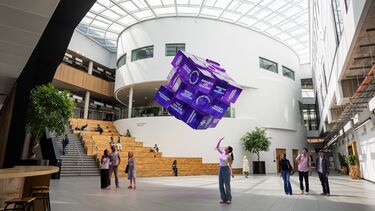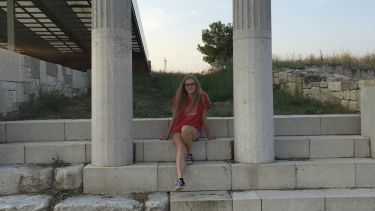I love studying archaeology at Sheffield because my professors make the lessons engaging, accessible, and relevant to my personal interests
Which scholarship have you been awarded?
International Postgraduate Merit Scholarship
Why did you decide to study this degree programme?
I completed a BA in Classical Archaeology and a BA in Anthropology at the University of Michigan and wanted to continue my education at a school that combined both aspects of archaeology into one degree. Sheffield has both a cross-discipline and a Mediterranean pathway for the MA Archaeology, so it was a perfect fit for my academic interests.
What do you enjoy most about your course and the subject you are studying?
I love archaeology because it is a hands-on occupation that involves both an academic and a physical component, ensuring that I never get bored while working. The discipline is centered around discovering new things and exploring the past, and every discovery is exciting and allows for engaging research opportunities. The physical aspect of excavation and lab work is also a large draw for me, because I enjoy getting to travel to sites, working in the field, and learning new practical techniques.
What attracted you to the University of Sheffield?
Sheffield has a world-renowned archaeology program, and I am very interested in working with specific faculty for my postgraduate degree. It is rare to find a professor that researches exactly what you want to study in the future, but I was able to find such a person at Sheffield. I am excited to take advantage of the resources and academic freedom that the university offers. For me, studying at Sheffield also provides an opportunity to broaden my experience in a new part of the world.
What made you want to study in the UK?
I like the UK system of higher education more than the American system, and I also wanted to broaden my worldview and live abroad to gain valuable experience in a different type of workplace. The career pathways in America do differ from the ones in the UK, so I thought it would be useful to experience both and decide which one I wanted to pursue. I also thought that it would be fun to live in the UK in general.
What is it like to be a postgraduate student in the Department of Archaeology?
I love studying archaeology at Sheffield because my professors make the lessons engaging, accessible, and relevant to my personal interests. I have had at least 3 classes where the professor asked the class at the beginning of the semester what they would like to cover and if anyone had specific interests so that they could make sure to include them in the lecture. They also take our classes on field trips to nearby archaeological sites or historical places to give us hands-on learning experiences. I have never been overwhelmed by the workload, and my professors are always happy to help answer my questions both in lectures and outside of class. I feel very supported by my department and am not afraid to ask questions or engage in discussions.
What do you plan to do when you finish your degree at Sheffield?
I plan to enter the workforce for a couple of years before returning to the academic world to complete a PhD. Since I do not know what I want to write a PhD thesis on yet, I believe that working in the commercial or governmental sector of archaeology for a few years will provide a helpful perspective that I have not had a chance to engage with yet.
How has the department and/or University helped you to work towards reaching your goals after graduation?
The department has provided amazing careers resources and support that I have not received anywhere else, and the professors in charge of the Careers Week made sure to answer any questions about joining the commercial archaeology workforce and even brought in professionals to chat with students. There have also been information sessions concerning PhD programs and what is required for a successful application, which has been incredibly helpful in planning my future.
What do you like most about living in Sheffield?
I love exploring all of the small cafes and businesses hidden around the city. Sheffield is a very welcoming, vibrant, and exciting place to live. It is very easy to make friends, find new things to try, and balance my classes with my social life. The university also has a wide range of clubs and societies, which encouraged me to join completely new groups like Beekeeping Society and learn new skills.
What has been the most difficult thing to get used to whilst living in a different country?
Luckily for me, I have not experienced major culture shock or had a difficult time settling into a new country. The most difficult part was moving away from all of my family and friends, but I was able to make new friends within the first month so I did not experience more than a week or two of feeling alone.
Do you have any advice for students from your home country thinking about studying a postgraduate course in archaeology at Sheffield?
Sheffield is an amazing pace to live and study. As an international student, it has been very easy for me to make both local and other international friends, try a bunch of new foods and activities, and have fun in my classes. I genuinely enjoy all of my classes and have learned so much in just a few short months. The high quality of classes and professors makes learning engaging, interesting, and exciting. Take advantage of everything the university offers, get outside of your comfort zone, and have fun!

Postgraduate online open day
Become part of our community of talented postgraduate taught students. Register now to join us at our online open day on Wednesday 26 November 2025.

